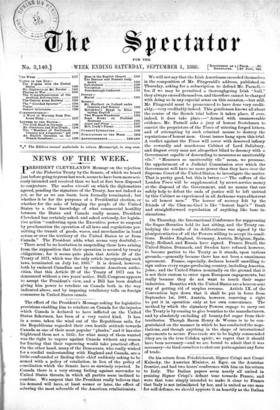NEWS OF THE WEEK.
PRESIDENT CLEVELAND'S Message on the rejection of the Fisheries Treaty by the Senate, of which we beard just before going to press last week, seems to have been more seri- ously intended and received than we had at first been disposed to conjecture. The modus vivendi on which the diplomatists agreed, pending the signature of the Treaty, has not indeed as yet, so far as we can learn, been formally terminated ; but whether it be for the purposes of a Presidential election, or whether for the sake of bringing the people of the United States to a clear knowledge of what commercial hostility between the States and Canada really means, President Cleveland has certainly asked, and asked seriously, for legisla- tive action " conferring upon the Executive, power to suspend by proclamation the operation of all laws and regulations per- mitting the transit of goods, wares, and merchandise in bond across or over the territory of the United States to or from Canada." The President adds, what seems very doubtful,— "There need be no hesitation in suspending these laws arising from the supposition that their operation is secured by treaty obligations; for it seems quite plain that Article 29 of the Treaty of 1871, which was the only article incorporating such laws, terminated on July 1st, 1885." It is denied, however, both by eminent Canadian and by eminent American autho- rities, that this Article 29 of the Treaty of 1871 can be denounced without a two years' notice. Still, Congress appears to accept the President's view, and a Bill has been drafted giving him power to retaliate on Canada both in the way indicated above, and by imposing retaliatory tolls on foreign commerce in United States canals.


































